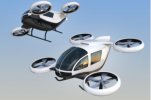- Date
- 26 January 2022
Boeing Invests $450 Million in Self-Flying Taxi Developer Wisk
Boeing Invests $450 Million in Self-Flying Taxi Developer Wisk
By BK |
What do you need to know this week?
As part of an existing joint venture project, Boeing - the world’s largest aerospace company and leading manufacturer of commercial jetliners, defence, space and security systems - is investing a further $450 million in Wisk Aero.
The US aerospace giant plans to develop the first autonomous passenger-carrying vehicle to be certified in the US. Although Wisk Aero is “one of dozens of electric vertical takeoff and landing makers”, its unique selling point is its focus on autonomous flight.
Why is this important for your interviews?
Boeing’s recent investment suggests that leading aerospace giants are branching out to alternative, high-growth 'sub-industries' to diversify their portfolio. This strategy may be an attempt to mitigate risks arising from an over-reliance of ‘traditional’ streams for revenue, for example, manufacturing commercial airliners, which were devastated by the onset of the pandemic.
The autonomous aviation sector is an emerging sector with immense growth potential. According to management consultancy firm McKinsey & Co, investors have poured more than $7 billion into companies focused on future air mobility solutions. The amount invested in this sector within the last year is more than double the amount of funding the sector has received within the last 10 years. However, Boeing’s not the only player in this market. Rival plane makers such as Airbus and Embraer, are developing their own electric air taxis.
How is this topic relevant to law firms?
Firstly, the industry needs to develop the infrastructure to support a high volume of self-driving aviation vehicles. To support self-driving cars, infrastructure such as roadside sensors, machine-readable signs and stronger fibre and sensor telecommunication networks will need to be rolled out. However, both installation and maintenance are costly and time-consuming. Law firms may stand to gain from advising governments in their quest to build up their nation’s infrastructure to support autonomous vehicles. In addition, law firms may also gain work from private clients to build private airports, runways, energy lines and factory plants and so on.
Secondly, aviation safety regulators are not expected to certify self-driving airplanes within the next few years. The EU Aviation Safety Agency (‘EASA’) only expects to see the first commercial piloted air taxi operations to be in place by 2024-25. Safety remains the chief concern for both autonomous drones and taxis, as well as noise pollution in the case of passenger vehicles. The EASA has also expressed concern on cybersecurity in the case of drones. Law firms will not only need to advise clients on the changing regulatory landscape, but also to advise on whether, in light of all these regulatory concerns, running a self-flying air taxi would be profitable in the long-run.
